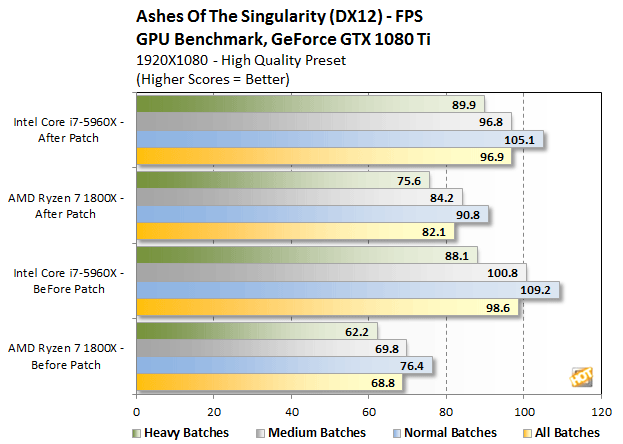AMD Ryzen Game Optimization Begins: Ashes Of The Singularity Patched And Tested
With some highly threaded workloads and even some game-related tests, like Cinebench, POV-Ray, or 3DMark’s Physics tests, for example, the Core i7-6900K and Ryzen 7 1800X were competitive with one another in our initial review. But it wasn’t even close in Ashes Of The Singularity, so we were eager to test out an updated version of the game when we caught wind that Stardock and Oxide Games had completed the initial optimization of Ashes for AMD Ryzen desktop processors.
Oxide -- the makers of this game -- put out a statement on this situation with AMD Ryzen performance. “Oxide games is incredibly excited with what we are seeing from the Ryzen CPU. Using our Nitrous game engine, we are working to scale our existing and future game title performance to take full advantage of Ryzen and its 8-core, 16-thread architecture, and the results thus far are impressive. These optimizations are not yet available for Ryzen benchmarking. However, expect updates soon to enhance the performance of games like Ashes of the Singularity on Ryzen CPUs, as well as our future game releases,” said Brad Wardell, CEO Stardock and Oxide.
|
Below, we have an array of benchmarks tests at two resolutions, using two different graphics cards, with Ashes both pre- and post-patch. We compare a Core i7-5960X and Ryzen 7 1800X at 1080p and 4K, using either a Radeon RX 480 or GeForce GTX 1080 Ti...




 When we set out to test this new game patch on AMD's Ryzen platform, we realized how many different angles you could look at it from. There's Ryzen on NVIDIA GPUs, Ryzen on AMD GPUs, various in-game settings, 1080p gaming, and of course a quick check on high res gaming. Perhaps what's most interesting to see might be the fact that, even at 4K, with a powerful GPU like a GeForce GTX 1080 Ti, if a game isn't properly optimized for Ryzen, you can definitely leave frame rate and performance on the table. And at lower res like 1080p, though frankly you might not care as much because frame rates are higher anyway, performance will bleed as well, again if a CPU-intensive game engine like Ashes isn't optimized to utilize AMD's Zen architecture and its CCX core modules efficiently.
When we set out to test this new game patch on AMD's Ryzen platform, we realized how many different angles you could look at it from. There's Ryzen on NVIDIA GPUs, Ryzen on AMD GPUs, various in-game settings, 1080p gaming, and of course a quick check on high res gaming. Perhaps what's most interesting to see might be the fact that, even at 4K, with a powerful GPU like a GeForce GTX 1080 Ti, if a game isn't properly optimized for Ryzen, you can definitely leave frame rate and performance on the table. And at lower res like 1080p, though frankly you might not care as much because frame rates are higher anyway, performance will bleed as well, again if a CPU-intensive game engine like Ashes isn't optimized to utilize AMD's Zen architecture and its CCX core modules efficiently. However, as we've seen here, only a month out of the gate since launch, AMD can indeed work with game developers to wring more performance out of Ryzen and the intrinsic round-trip latency that occurs when processing data that needs to traverse CCX modules (4-core clusters in the case of Ryzen 7). In fact, our testing efforts with the Ashes patch here spurred a lot of discussion about the bet AMD placed with its Zen architecture and any potential advantages or disadvantages it has in scalability.
By taking a more modular approach with the Zen/Ryzen CCX architecture, AMD was able to build processors efficiently from a cost standpoint, as is evident in Ryzen 8-core pricing versus Intel at half the cost. However, they also have an architecture that can scale extremely well, with its Infinity Fabric coupling even more CCX core clusters for server chips in the data center with AMD's Naples platform; and the data center is an absolute cash cow business, one that Intel guards fiercely. With Naples' inherent CPU resources, memory bandwidth and PCIe IO connectivity advantages over Intel Xeon currently, it looks like AMD's CCX modularity bet could pay off handsomely in the server market.
And, as we've seen here today, in extensive testing of at least one patched game title, game devs can optimize for Ryzen's modular CPU core approach as well. If AMD can continue to foster development and optimization in the game developer community like they have with Oxide Games, gamers and performance enthusiasts should be happy as well moving forward, for Ryzen to the occasion with AMD's new processor family.








